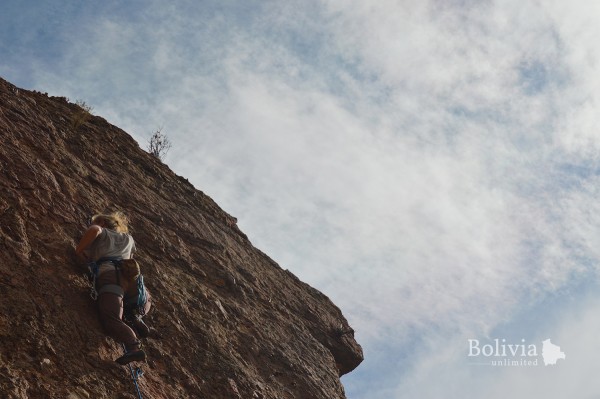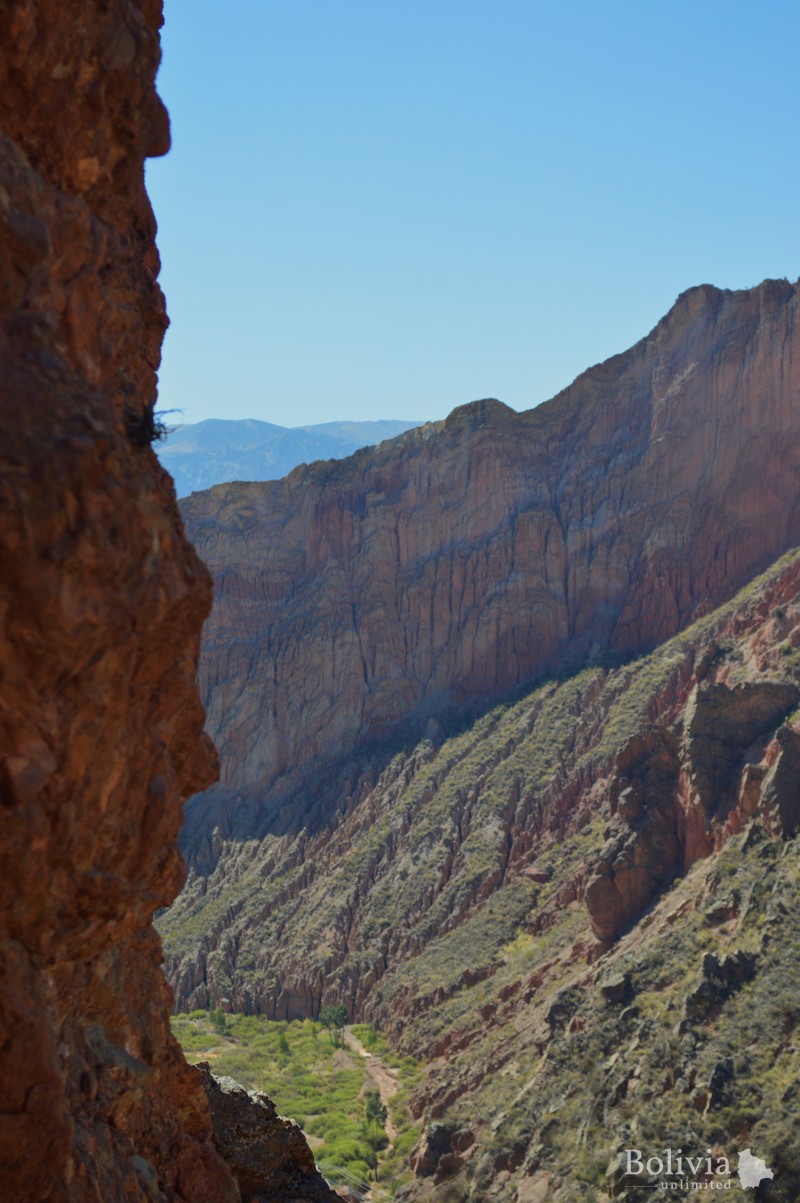Catch me if I fall / Atento que caigo

29 Aug, 2020 | Alfonso Gorostiaga
Photos: Alfonso Gorostiaga
ENGLISH VERSION
Rocklimbing in La Paz
The rocks have names that correspond to their personalities; the cookie, the razor, monkey back, Bolivar Crux, the predator, champagne. In technical terms, we could translate these into a level system starting at 4a, the easiest, and ending at 9c, the almost impossible (google Adam Obra to understand what I mean). The surrounding mountains watch us as we climb, they set the mood, there are shadows that chill you to your core and sun beams that warm your skin. We have friends spurring us on from below, inspirational music and we feel present all afternoon. With the incredible experiences that it brings, it is difficult to understand why so few practice rock climbing. Particularly in Bolivia.
It is natural to be attracted to what we are normally exposed to. Human beings, as a species, are curious; you go from exploring your garden, to exploring your neighbourhood, then your country, then the continent etc. However, something strange happens in La Paz, despite having the hills within walking distance, people don’t tend to exploit their sporting potential, at least not to the extent they could. The main reason, accepted en masse by climbers, is not knowing that there is the possibility of practicing this sport. It is ironic, we are surrounded by hills, peaks and mountains, and although some encourage us to climb them, there are very few who take to climbing regularly and constantly.
The community of local climbers may be very experienced, but they are not a big group. The advantages are that almost everyone within the group knows one another and feels safe, supported and there is only a healthy dose of competitiveness. However, the group size indicates how the outdoor activity is not popular. The fact that it is a relatively new community may be a reason why the sport hasn't taken off. A first generation of climbers are still active today, although we mustn’t emphasise that for much longer. Being able to see the exploits of experience and hear the thousands of anecdotes and advice these teachers give is just one more reason why the rock climbing scene is so interesting.
It’s not just the stories, but having the mountains so close and dealing with relatively ‘unspoiled’ areas (bearing in mind that there aren’t thousands of people climbing) allow one to connect with the environment in an almost spiritual way. Not only do we talk about living alongside nature but about understanding and integrating nature as part of ourselves. If you are from La Paz, rock-climbing is to explore one more part of what identifies us as part of this area of the country. If you aren’t a paceño, it is to understand each other through a completely alternative means and sometimes you end up knowing someone better this way than an intimate conversation.
For all those who are in the city of La Paz, I pass on this piece of information, some of the best climbing areas include Sendero del Aguila, Aranjuez and Lake Titicaca. Enter into a dialogue with nature, meditate, get to know your body, your mind. Enjoy the day, the rays of sun, the company, a healthy snack, the satisfaction of improving yourself through physical activity. I guarantee you that you will see a radical change. In addition, mountain climbers are laid-back and fun and the views from the top will take your breath away.

------------------------------------------------------------------------------------------------------------------------------
VERSIÓN EN ESPAÑOL
Escalada en La Paz
Los peñones tienen nombres que responden a su personalidad; la galleta, la navaja, espalda de mono, Bolívar crux, el depredador, champagne. En términos técnicos, dentro de la escalada en roca, se contempla un sistema de niveles, empezando por el nivel 4a - para principiantes - y terminando en 9c - el casi imposible (pueden buscar la referencia de Adam Obra para entender de qué hablo). Las montañas alrededor se presentan como espectadoras, las mismas que forman parte principal de la escena y marcan el humor, las sombras que apuñalan con el frío y el sol que pega sopapos. Tenemos los amigos alentando, la música motivando y toda la tarde para estar presentes en el momento. Con la calidad de interacción que se tiene y con todo lo que rodea esta actividad, es difícil llegar a entender por qué son tan pocos los que practican la escalada en roca, hablando, claro está, dentro del contexto de locales bolivianos.
Es natural verse atraído por aquello a lo que estamos normalmente expuestos. El ser humano como especie es curioso; pasas de explorar tu jardín, a explorar tu barrio, luego tu país, el continente etc., etc. Pero en La Paz sucede algo extraño, a pesar de tener los cerros a distancia de una caminata, la gente no tiende a explotar su potencial deportivo, al menos no en la cantidad que podría. La razón principal, aceptada en caterva con algunos escaladores, es el no saber que existe la posibilidad de practicar este deporte. Es irónico, estamos rodeados de cerros, picos y montañas, y si bien algunos animan a subirlos, son muy pocos a los que se les da por escalar de forma habitual y constante.
También debemos admitir que la comunidad de escaladores locales, aunque bastante consolidada, no es muy grande. Esto viene a ser bueno y malo al mismo tiempo. Bueno porque casi todos dentro del colectivo se conocen y se crea un ambiente seguro, solidario y solo lo necesariamente competitivo. Malo porque en efecto no se llega a popularizar la actividad. Se le puede atribuir a esto último también el hecho que es una comunidad relativamente nueva, con decir que la primera generación de escaladores sigue hoy en actividad, aunque debemos recalcar que no por mucho más tiempo. Poder ver las hazañas de la experiencia y escuchar los miles de anécdotas y consejos que estos maestros dan es solo una razón más por lo que la escena del rock climbing aquí es tan interesante.
Y no solo son las historias pero tener las montañas/cerros tan cerca y el tratar con áreas relativamente ‘vírgenes’ - en sentido que no hay miles de personas escalando - permiten a uno conectarse con el entorno de una manera casi espiritual. No solo hablamos de convivir en la naturaleza sino entender e integrar la naturaleza como parte de nosotros. El rock climbing, si eres paceño, es explorar una parte más de lo que nos identifica como parte de esta área del país. Y si no eres paceño es entendernos/conocernos por un medio completamente alternativo y a veces hasta más certero que una íntima conversación.
Para todos los que se encuentren en la ciudad de La Paz les paso la información; algunas zonas de escalada son: el Sendero del Águila, Aranjuez y Lago Titicaca. Entablen diálogo con la naturaleza, mediten, conozca su cuerpo, su mente. Disfruten del día, de los rayos del sol , de la compañía, de una merienda saludable, de la satisfacción de superarte a ti mismo a través de una actividad física. Garantizo 100/100 en que verán un cambio radical. Además que la gente de montaña es “buena onda” y las vistas desde lo más alto te roban el aliento.







